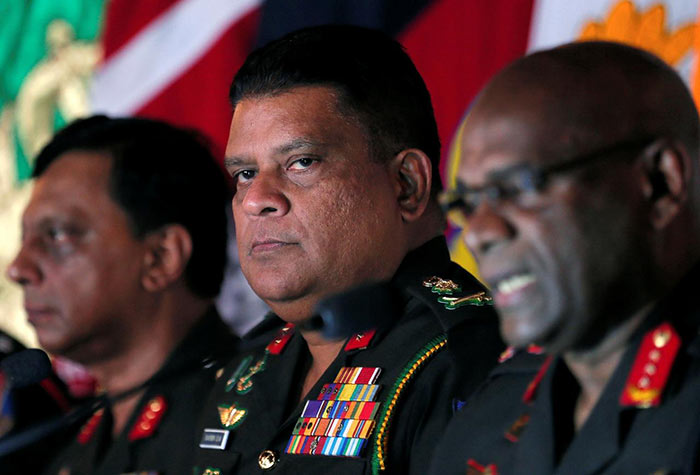Sri Lanka rejects criticism of army chief’s appointment

Sri Lanka’s government on Tuesday hit out at foreign criticism of its appointment of a general accused of war abuses as the new army commander.
The foreign ministry said in a statement that the decision to appoint a new commander was a sovereign decision by the head of state.
“Foreign entities trying to influence the decisions and internal administrative processes of public service promotions in Sri Lanka is unwarranted and unacceptable,” it said.
“Articulating a position of concern on this appointment by certain bilateral partners and international organizations, based on allegations, is regrettable and contrary to the principles of natural justice espoused by all responsible members of the international community,” it said.
President Maithripala Sirisena on Monday appointed Lt. Gen. Shavendra Silva as the new army commander.
Silva was in charge of the 58th Division, one of the groups that encircled the final stronghold of the Tamil Tiger rebels in the last stages of the civil war in 2009. The government declared victory over the rebels in May 2009, ending the Tamil Tigers’ 26-year campaign for an independent state for minority ethnic Tamils.
Both the Sri Lankan military and the rebels have been accused of wartime abuses. The United Nations has said some 45,000 ethnic Tamil civilians may have been killed in the final months of the conflict.
According to a 2015 investigation by the U.N. office of the High Commissioner for Human Rights, near the end of the war Silva was tasked with capturing the Putumattalan area from the Tamil Tigers. It found evidence that both a hospital and a U.N. hub were shelled.
The investigation cited witnesses as saying cluster-type munitions were used by the Sri Lankan armed forces in their attacks on Putumattalan hospital and the United Nations hub. Silva has denied the allegations.
The government promised the U.N. Human Rights Council in 2015 that it would investigate the allegations and involve foreign prosecutors and judges, but nothing has been done so far.
The U.N. chief’s spokesman and the U.S. Embassy in Colombo expressed concern about Silva’s selection, saying the move undermines the post-war justice and reconciliation process which the government has promised to undertake.
In Washington, a senior State Department official said Tuesday the United States was “deeply concerned” by Silva’s appointment and was registering its objections. The official, who was not authorized to discuss diplomatic discussions publicly and spoke to reporters on condition of anonymity, said the appointment could affect cooperation and improved military relations between Washington and Colombo.
The official said the appointment “undermines Sri Lanka’s international reputation and its commitments to promote justice and accountability.” The official added that should Silva remain in the post it might also hurt a planned $480 million Millennium Challenge Corporation grant intended to help the country modernize its urban transport system and networks.
U.N. High Commissioner for Human Rights Michelle Bachelet said Sri Lanka’s move could impact its ability to contribute to U.N. peacekeeping missions.
The European Union delegation in Sri Lanka issued a statement Tuesday endorsing Bachelet’s comments.
It said Silva’s promotion “calls into question Sri Lanka’s commitments to the U.N. Human Rights Council, as recently as March 2019, to ensure justice and accountability. It also undermines Sri Lanka’s efforts towards national reconciliation and sends a worrying message to victims and survivors of the war.” The statement was issued in agreement with the embassies of Germany, Italy, Netherlands, Norway, Switzerland and the United Kingdom.
(AP)

Latest Headlines in Sri Lanka
- Popular rapper Shan Putha arrested with firearm March 14, 2025
- Batalanda commission report tabled in Sri Lankan Parliament March 14, 2025
- Female Grama Niladharis withdraw from night duty over security concerns March 14, 2025
- Sri Lanka ranked as the best country for settling down March 14, 2025
- UN pledges support for Sri Lanka’s industrial and SME development March 13, 2025



The Paraya State re-born.
What a way to end the Yahapalana !!
Millenium Corp USD 480 million funding of transport management and land Registry digitisation goes down the drain.
The US Funds were aimed at improving transport management efficiency and provide assusrance to small and large scale land owners security of property ownership.
These two pet projects were initiated by PM RW in his drive to modernise the nation and drive quality of life to the next few steps.
Our Defence Minister (the scraggy King) has no understanding of issues. he constantly refers to ‘backboneless leaders’, a sign of serious inferiority complex from which he suffers.
In his last days, he is attempting to prove that he has a ‘backbone’ by confronting super powers and the IC with illogical decisions.
The only silver lining in the dark cloud is that the scraggy King will be shut in the National Rubbish Bin for good at the end of this year.
The new Army Commander cannot travel to many nations as our representative in military matters.
He has been denied entry in the past and could be taken into custody for alleged war crimes.
Surely, does wish to be in this position?
We continue to be in a state of denial rather than resolve root causes to the satisfaction of all.
All u Sri Lankans who think we should bend over to the US like our butterfly leader should be ashamed of your selves. China has been giving us financial aid and loans but do they interfere with our affairs. Have all you guys never wondered why Sarath F never faced any war crimes allegations even though he was the army commander.could it be because he is in thebutterfly party.